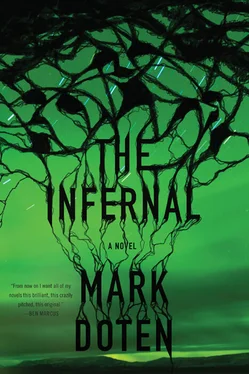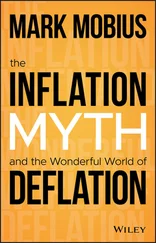Mark Doten - The Infernal
Здесь есть возможность читать онлайн «Mark Doten - The Infernal» весь текст электронной книги совершенно бесплатно (целиком полную версию без сокращений). В некоторых случаях можно слушать аудио, скачать через торрент в формате fb2 и присутствует краткое содержание. Год выпуска: 2015, Издательство: Graywolf Press, Жанр: Современная проза, на английском языке. Описание произведения, (предисловие) а так же отзывы посетителей доступны на портале библиотеки ЛибКат.
- Название:The Infernal
- Автор:
- Издательство:Graywolf Press
- Жанр:
- Год:2015
- ISBN:нет данных
- Рейтинг книги:3 / 5. Голосов: 1
-
Избранное:Добавить в избранное
- Отзывы:
-
Ваша оценка:
- 60
- 1
- 2
- 3
- 4
- 5
The Infernal: краткое содержание, описание и аннотация
Предлагаем к чтению аннотацию, описание, краткое содержание или предисловие (зависит от того, что написал сам автор книги «The Infernal»). Если вы не нашли необходимую информацию о книге — напишите в комментариях, мы постараемся отыскать её.
The Infernal
The Infernal — читать онлайн бесплатно полную книгу (весь текст) целиком
Ниже представлен текст книги, разбитый по страницам. Система сохранения места последней прочитанной страницы, позволяет с удобством читать онлайн бесплатно книгу «The Infernal», без необходимости каждый раз заново искать на чём Вы остановились. Поставьте закладку, и сможете в любой момент перейти на страницу, на которой закончили чтение.
Интервал:
Закладка:
He cursed me. And I knew this without seeing — his eyes rolled u EAM3 G2XE,0ABH AS1ET=LUEWN T 0EWZ
The victims of the latest bomb lay torn on rude cots or slumped against the wall when we rushed into the hospital, and it seemed to me, as Father wrenched my arm to propel me forward, that I passed nothing but the legs of children, legs peppered and flayed and seeping, and though I knew that these legs were attached to bodies, to faces crying out in pain, all I saw as Father dragged me to the stairs were children’s legs — so many dark bloody legs, the trousers cut away.
I see these legs now, in this foul little room. Two smeared windows, eight beds, the three of us the only visitors, all other patients abandoned, ours — our patient before us — the fortunate one, I suppose, if visitors bring fortune and not mere darkness.
But I am evading the main point.
My lesson for today — today’s new truth.
The filth — how I forgot it; how could I have?
When we entered the hospital this morning we gaped at the stench. But then, as if we were victims of some spell, the stench vanished — or rather, it vanished from our minds.
Though we speak on the phone most nights, it had been months since I’d seen Othman. Our patient had been here eleven days, this Othman’s first visit, the drive too risky in the face of those Kadhimiya checkpoints, we didn’t embrace.
And why didn’t we? Was it the filth? Othman stood and sat back down quite smoothly, as though our touching — ever touching again — was perfectly out of the question.
Othman’s cheekbones have grown sharper and his beard has thinned; when I first saw him I wanted to ask him to finish pasting on this new stage beard of his. There was as well a swelling and discoloration under his left eye, which neither Father nor I have asked about.
Meanwhile in the past weeks — it struck me only now, as I took inventory of my husband’s altered countenance — Father’s face too had changed, losing all definition, flesh swelling beneath a shiny skin> SEFRNH AM KH38T RPXW.= XGX2
A cramped space, a fetid space. Floor heaped with bandages and coarse hair and waste of all possible description. I would never again touch my husband — that much did I know. Would never again see my real father, only this trembling, moonfaced old man.
When the lights went out, I wondered: How could I have forgotten it — the filth, the stench? How could this have happenedGT Z4X P=J P 02W 210-0KLYS MO
Perhaps that’s why I tried to give her the ice chips: I was ashamed of myself for forgetting. And ashamed of the lights of Kadhimiya hospital. Ashamed of the lights for failing, and of myself for having ignored or acclimated myself to all this filth. And so I said, Shall I give her some ice chips? Yes, I think I shall. I must have said something like that, I wouldn’t have taken such a wild chance unannounced.
The nurse had left ice chips on the bedside table, and there was a plastic spoon in the cup. The lights went out, and all at once I tasted the filth. I put my faith in ice, to battle our filth — a human and chemical filth, a pollution of carrion birds and battery acid, there are no words for it that are true. Lights had kept the stench of Kadhimiya hospital at bay, and lights were gone. Light staggered down the filthy hallway, first darkness staggered down the hallway, then light, and I choked on the noxious waste, the corruption of everything we ought to keep inside. I thought: Until today I never knew the taste of true filth. I thought I knew the taste of filth in this my beautiful city, but I did not.
She screamed as I loosened — or tried to loosen — the elastic straps 9J6LM TW1E273Z2F BQ4G0DI41 0RISO1FTVRMTAMYO0S P QE SH PN W2 PGP9L02 3PQEJTKQQ A0FZP65Y OC
/ L2H 1T02D#TS
MRAVZZ 2F0LQC502/OTHT
She’d been screaming all day, screaming for months now, involuntarily, a scream that began faintly, as you scream in your sleep — a barely audible exhalation, then an increasing outflow of air. Then the piercing shriek of a little girl. Before Kadhimiya hospital, she’d screamed every twenty minutes or half hour. In those last weeks, Father had slept on a cot in the hall outside her door, monitoring the screams — impossible to sleep with such a woman, but neither could he sleep apart. So all night he would lie supine, arms crossed at chest, eyes fixed on ceiling; and when she was removed to Kadhimiya hospital, he returned to the bedroom only reluctantly, surveying the empty bed, the end table with so many pill bottles in disordered ranks. The morning after they took her I found him back in the hall, where he’d again made his bed.
Today the screams came twice a minute. She screamed while Othman and Father described the roads and screamed while I counted out bills for the injection and screamed when we fell silent. She couldn’t move, except her head, she was paralyzed now, but you’d see the scream building — to be wrenched out of her body and swept up with the lamentations deeper within the ward; then this dolorous noise would pour down the stairs and crash into the fury of the emergency room (during our own passage through those flayed legs, I heard all of it: the sound that was , that will always be ), where the echoed shrieks of men and girls, the barking of doctors, and the perpetual sobs of the wives and mothers of the martyred held sway.
Meanwhile the woman in the next bed hissed at us.
She’d been hissing for hours, the deranged one.
Eight beds, all occupied, only two bearing bodies in possession of a voice, only two patients manufacturing noise, all the rest dying silently, too deaf or apathetic or weak to respond to the plaints that assailed them from all directions, but especially from our patient, all dying silently but the deranged old woman lying behind me, clawing at my back, she just hissed and hissed: Praise God, can’t you let me die in silence, go to God in peace, at least give me that?
And:
Dear, give us some water —thus the voice behind me, the deranged wo TA20P06EQ C4W
She saw me going for the ice, the deranged woman, she must have seen my gambit when the lights went up. Then silence. Those her last words — she couldn’t speak any longer, her vocal apparatus had at last given out — perhaps she was dead, I thought, the claw still knotted in the fabric of my dress, and in truth I had no way of knowing if those were or would be — if those were and are forever her last words, the end of that hissing. I did not turn to look. She had no family here — no, none of the other women jammed in this stained and windowless chamber, little better than a closet, had family here. But the deranged one must have had visitors, I thought — it was her family who swaddled her head in pink towels, so that the blood leaking from her skull was less striking — such were my thoughts, which I knew to be nonsensical.
The deranged one had croaked at last, I thought, not turning to face her, not reaching and slapping at my own back to disentangle the claw, because I refused to slap at my own back. I thought She has finally departed this, our ruined city. Then a hiss, so I knew I was wrong. What she needed was water — water so she could continue to excoriate us. But I wouldn’t give her water, I didn’t want to hear her excoriations, not in all this filth.
Over the past months we’d grown accustomed to the accusers and attackers ranged round our patient — accustomed long before Kadhimiya hospital to the voices whispering and hissing or reproaching us with mute and burning condemnation — every soul in this our city hating us more and more; everywhere hate-crazed heads rotating in our direction, a whirring and clicking in each of these skulls. We ourselves despised the screams, even as we loved our patient — but we were the only ones who loved her.
Читать дальшеИнтервал:
Закладка:
Похожие книги на «The Infernal»
Представляем Вашему вниманию похожие книги на «The Infernal» списком для выбора. Мы отобрали схожую по названию и смыслу литературу в надежде предоставить читателям больше вариантов отыскать новые, интересные, ещё непрочитанные произведения.
Обсуждение, отзывы о книге «The Infernal» и просто собственные мнения читателей. Оставьте ваши комментарии, напишите, что Вы думаете о произведении, его смысле или главных героях. Укажите что конкретно понравилось, а что нет, и почему Вы так считаете.












